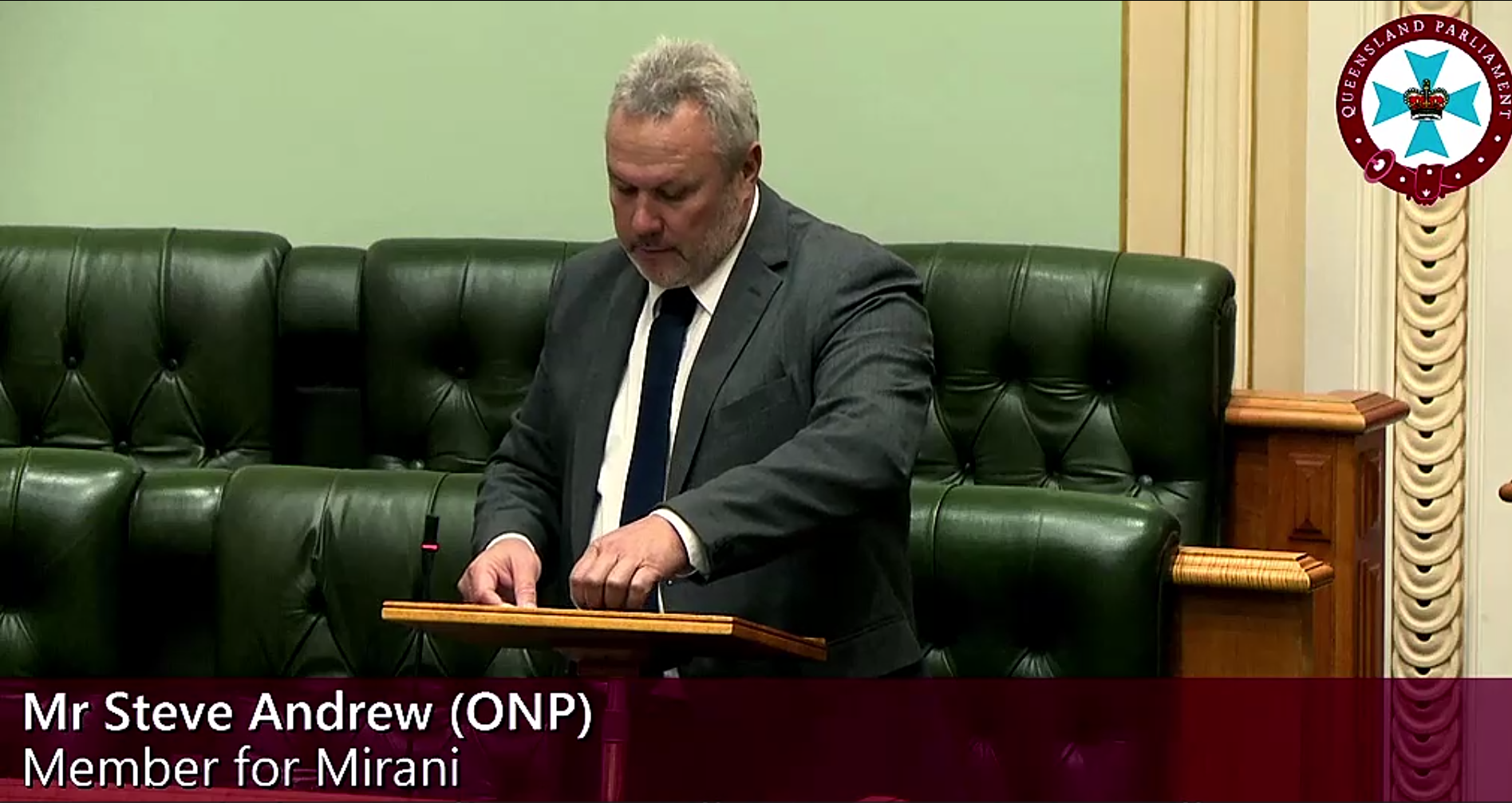Stephen Andrew MP – Appropriation (Parliament) Bill & Appropriation Bill – Transcript
Mr Andrew: I rise to speak on the appropriation bills with particular reference to the report on the estimates process of the Health and Environment Committee.
You do not need to look very far to find a recent story on the worsening healthcare crisis in Queensland, whether it is about long wait times for appointments, lack of access to basic health care, spiralling costs of services, the availability of medicines or burnout amongst healthcare staff who do a great job of providing what they do here in Queensland, and I take my hat off to them every day and night that they have to work under the situation.
At the estimates hearing, we heard that ambulance ramping has worsened to 45 per cent across Queensland and that there are now almost 60,000 Queenslanders waiting for elective surgery across the state.
Meanwhile, Queenslanders with suspected cancers are being kept waiting months to receive the results of their biopsies, scans, and MRIs, putting many patients’ lives at risk.
Pathology Queensland confirmed that at one-point things got so bad that they were forced to send some scans to Victoria for testing due to the enormous overload with which they were faced.
Then there is the decline in Queenslanders with private health coverage and chronic shortage of medical staff across all areas within health care.
At estimates, the minister revealed that 584,431 people presented at Queensland’s emergency departments last quarter, the highest recorded amount in the state’s history.
This growth is placing enormous strain on Ambulance Service, with patient off stretcher times, or POST, steady at 55 per cent. All of these issues are even more acute in rural and remote areas.
In my electorate of Mirani and surrounding regions, there has been a big drop in the patient off stretcher times at both the Mackay and Rockhampton Base hospitals since 2015.
According to Queensland Ambulance Service data, the average POST rate at Mackay went from 95 per cent in 2015 to 73.5 per cent in 2021, while the Rockhampton Hospital dropped from 99 per cent in 2015 to just 52 per cent in 2021.
A recent report by the Queensland Audit Office found that for the period from July 2020 to February 2021, only one of the top 26 reporting hospitals in Queensland met the 90 per cent target for both patient off stretcher times and emergency length-of-stay rates.
The Auditor-General notes that overall POST performance for the top 26 reporting hospitals has decreased from 88.9 per cent in 2014-15 to 68.5 per cent for the period July 2020 to February 2021, and in 2023 it remains steady at 55 per cent.
Both the Auditor-General and the minister attribute this huge decline in standards to the increasing complexity of emergency department presentations in Queensland.
Since 2015, category 1 presentations—immediately life-threatening—has grown by a massive 41 per cent, while category 2 presentations—imminently life-threatening or very severe pain—increased by 50 per cent.
Maternity units remain under considerable strain across the state.
The Biloela and Gladstone hospital maternity wards have been out of commission for many months, forcing women to travel significant distances to Rockhampton just to have their babies.
Some of them have had them on the side of the road, I believe. Currently we have no maternity services at Weipa, Chinchilla, Biloela and Cooktown, and there has been no indication as to when these services will be back online.
We need immediate and long-term solutions to address maternity healthcare access issues in regional Queensland, including better incentives and workforce rotations.
The additional stress, uncertainty, cost and risks that the lack of maternity services is causing people in regional Queensland is unacceptable.
This should not be happening in a First World country or a First World health service. The crisis in maternity healthcare access is being replicated across health care more widely.
It is time we saw a restoration of critical services to deliver appropriate care across the whole healthcare system in Queensland, especially in the regions.
We need more recruitment and retention initiatives and incentives, better workflow management and better funding to make it happen.
We also know that attracting doctors and nurses to regional areas is made much harder by the lack of housing, the lack of schools and the lack of social infrastructure.
Services need to be designated to meet the needs of diverse communities in consultation with communities they serve. The government needs to start listening.
Improving the lives and the health of people in the regions requires a holistic approach, not the same old one-size-fits-all model we are seeing fail time after time.
Above all, we need real action. There is not a lot of action here in this health space, nor in the environment space with the renewables as well.
The situation is getting worse and regional Queenslanders have been waiting far too long for the access to basic health care that they so desperately need. Thank you.

No responses yet